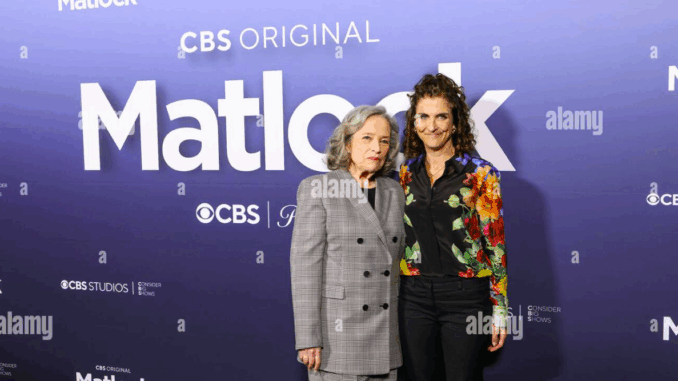
She walks to write. She walks to edit. She walks to think. Behind CBS’ sleek legal reboot is a showrunner who refuses to sit still — and a series that reflects her deliberate, steady rhythm.
Jennie Snyder Urman has a rule: don’t send notes until you’ve walked at least three miles.
The Emmy-nominated showrunner, best known for the vibrant world of Jane the Virgin, has traded telenovela flair for noir-shaded legal drama in CBS’ Matlock. But one thing hasn’t changed — her habit of writing while walking.
“I’ll walk the same three-mile loop around my neighborhood with my phone and earbuds,” she says. “Sometimes I just talk the episode out loud. Other times I’m editing scenes in my head. That’s where most of Matlock came from — miles and miles on foot.”
That methodical pace defines not just her creative process but the show itself. Matlock doesn’t sprint. It prowls. It lingers in boardrooms, it eavesdrops on secrets, it walks slowly into darkness — and then quietly explodes.
A Courtroom Drama That Refuses to Be a Courtroom Drama
At first glance, rebooting Matlock for CBS might sound like a safe move: recognizable brand, courtroom format, legacy appeal. But under Urman’s leadership, the series has swerved hard away from nostalgia and into something sleeker, darker, and far more unsettling.
Gone is the weekly-case structure of the 1980s original. In its place is a serialized legal thriller centered on Madeline Matlock (Kathy Bates), a retired judge who infiltrates a top-tier New York law firm — not to represent clients, but to expose the rot within.
“We knew we didn’t want to do another procedural,” Urman says. “There’s already plenty of that on TV. What we were more interested in was the slow corrosion of power — how systems protect themselves. What’s legal versus what’s right.”
The show has been described as “corporate espionage meets character study,” a kind of House of Cards in legal robes. Urman smiles at the comparison but shrugs. “I think of it more like a legal ghost story. Everyone’s haunted. Especially Madeline.”
Building a Female Lead Who Doesn’t Apologize
Urman’s reboot starts and ends with one radical choice: putting a 76-year-old woman at the center of a high-stakes drama — not as a mentor, not as a symbol, but as the engine.
Kathy Bates’ Madeline Matlock is cunning, restrained, and borderline intimidating. She rarely raises her voice. She rarely makes declarations. And she always knows more than she’s letting on.
“That was one of our earliest goals,” Urman says. “To create a female lead who didn’t explain herself. She’s not there to be liked. She’s there to win.”
That makes her an anomaly in the network landscape, where female characters are often softened or moralized. Not here. Madeline weaponizes ambiguity. She listens more than she speaks — and her silence often says the most.
“She reminds me of Columbo,” says David Del Rio, who plays Billy, one of the firm’s conflicted junior attorneys. “Except instead of asking ‘just one more thing,’ she lets you hang yourself.”
A Writers’ Room Without Easy Answers
The Matlock writers’ room isn’t built for speed. It’s built for pressure. Urman leads it like a puzzle master, dropping ethical bombs and then watching her team try to defuse them.
“We talk a lot about moral compromise,” says co-producer Lindsey Allen. “What happens when someone does the wrong thing for the right reasons — or vice versa. Can a whistleblower be a coward? Can a liar tell the truth in a courtroom?”
These aren’t questions with clean answers — and the show reflects that. By the end of season one, viewers don’t walk away with clarity. They walk away questioning every character’s motives, including Madeline’s.
Urman sees that as a feature, not a flaw. “I think viewers are smarter than we give them credit for. They want mess. They want contradictions. I certainly do.”
Why Walking Matters

There’s a rhythm to how Urman tells stories — and it’s tied to her steps. Her phone is full of audio notes from walks that later became whole arcs.
She once came up with an entire finale during a loop around Griffith Park. Another time, she rewrote a monologue on the move, murmuring lines into Voice Memos while passing dog walkers and joggers.
“Walking gives me distance,” she says. “And when I have distance, I can see what matters.”
It also gives her time — to pause, to question, to avoid the panic of fast television production. That patience has paid off. Matlock’s pacing feels like the walk itself: steady, purposeful, and aware of every footstep.
What’s Next for Matlock?
With season two on the horizon, Urman isn’t rushing the payoff. “We’ve laid a lot of traps,” she says. “Some will snap shut. Some won’t — yet.”
Rumors swirl around new characters, deeper corruption within Jacobson Moore, and the possibility of flashbacks revealing what Madeline left behind on the bench. Urman won’t confirm specifics. “We’re still walking,” she says. “But I know where we’re headed.”
And with Kathy Bates’ Matlock as the compass — sharp, deliberate, enigmatic — it’s clear that wherever Matlock goes next, it won’t follow a map.
It will follow the steps.